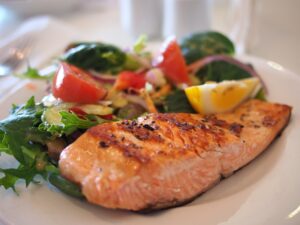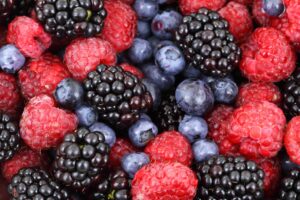Spinach and other leafy green vegetables

Hey, have you ever noticed how leafy greens like spinach are basically the Avengers of the healthy food world? They’re jam-packed with tons of good stuff that keeps your body running smoothly. And the best part? They won’t clog your arteries or make you feel like a sloth. But wait, there’s more! These veggies are also loaded with antioxidants that can help ward off diseases and even cancer. And let’s not forget about all the other good stuff they bring to the table – calcium, potassium, and a whole bunch of essential vitamins and minerals. They’re basically the MVPs of the produce aisle!
If you want to take your healthy eating game to the next level, make sure to incorporate plenty of these plant-based powerhouses into your diet. Not only are they an excellent source of fiber and protein, but they’re also high in antioxidants and other healthy vitamins and minerals. Think kale, collard greens, and broccoli – these foods are like the healthiest of the healthiest foods you can eat. And if you’re looking to lower cholesterol and reduce the risk of heart disease, try incorporating some salmon or walnut into your meals for a dose of omega-3 fatty acids and monounsaturated fats. In addition to these powerhouses, don’t forget about incorporating a variety of fruits and vegetables into your diet. Berries, citrus fruits, and dark leafy greens are great options for boosting your immune system and improving your overall health. And don’t forget about whole grains like quinoa, brown rice, and oatmeal, which are packed with fiber and essential nutrients.
If you’re looking to add some plant-based protein to your meals, consider incorporating legumes like beans, lentils, and chickpeas. These protein-packed foods are not only great for your health, but they’re also versatile and can be used in a variety of dishes.
Overall, the key to a healthy diet is variety and balance. By incorporating plenty of plant-based foods, healthy fats, and protein sources into your meals, you’ll not only feel better, but you’ll also be supporting your overall health and well-being. So get creative in the kitchen and start incorporating these plant-based powerhouses into your meals today!
The Importance of Omega-3

In a world filled with temptations like endless bags of chips and sugary treats, it’s easy to forget about the importance of incorporating healthy fats into our diets. Omega-3 fatty acids are not only a good source of heart-healthy fats, but they also provide a wide range of health benefits. While you may love indulging in a bowl of ice cream or a bag of chips, consider adding some omega-3 rich foods like blueberries, sweet potatoes, and avocados to your grocery list. These foods are not only delicious, but they are also packed with important nutrients that can help protect against chronic diseases and cancer.
When it comes to building a healthy diet and making healthy lifestyle choices, incorporating omega-3 rich foods is essential. Whether you prefer plant-based proteins like legumes or protein foods like berries, adding these items to your daily meals can help lower your risk of heart disease and cancer. Don’t forget about the power of vitamin C and vitamin E when it comes to protecting your heart and maintaining healthy bones and teeth. With a list of the top 15 omega-3 rich foods readily available, there’s no excuse not to try to eat healthy fats on a daily basis. Here are some top omega-3 rich foods to incorporate into your diet:
1. Fatty fish like salmon, mackerel, and sardines
2. Chia seeds
3. Flaxseeds
4. Walnuts
5. Hemp seeds
6. Algal oil (a plant-based source of omega-3s)
7. Soybeans
8. Brussels sprouts
9. Spinach
10. Avocado
11. Edamame
12. Kidney beans
13. Olive oil
14. Seaweed
15. Grass-fed beef
Incorporating these foods into your diet can provide your body with essential nutrients that help support overall health and well-being. Remember, small changes over time can lead to big improvements in your health, so start by adding just a few of these omega-3 rich foods to your meals each day and gradually increase as you become more comfortable with incorporating them into your diet.
Berries Are Nature’s Superfood

Berries are truly nature’s superfood. Not only are they delicious and colorful, but they are also packed with dietary fiber, vitamins, and antioxidants. Unlike some fruits that are high in calories and saturated fat or added sugar, berries are a guilt-free option that can easily fit into a healthy snack or meal. They are a versatile option that can be included in many food groups and are a great source of protein for those following a plant-based diet. In fact, a study found that eating just 15 foods, including berries, could help improve cardiovascular health and protect against heart disease and other chronic diseases.
Moreover, berries are not only a good source of vitamin, but are also high in nutrients that are essential for a healthy eating pattern. They are high in vitamin C, which can help boost the immune system and reduce the risk of chronic disease. Berries are one of the few foods high in protein as well as being high in healthy fats like omega-3 fatty acids. So, remember to eat a variety of berries along with other plant-based foods and different food groups to get the most nutritional benefit from these superfoods. Berries are also rich in antioxidants, which help protect the body from harmful free radicals that can damage cells and lead to inflammation and disease. Antioxidants can also help improve cognitive function and protect against age-related decline in brain function.
In addition, berries are a great source of fiber, which is important for digestive health and can help reduce the risk of heart disease, diabetes, and obesity. The fiber in berries can also help you feel full and satisfied, which can aid in weight management and overall health.
Overall, berries are a delicious and nutritious addition to any diet. Whether you eat them fresh, frozen, or dried, berries are a versatile and nutrient-dense food that can provide numerous health benefits. Incorporating a variety of berries into your diet can help support overall health and well-being.
Frequently Asked Questions – Healthy Foods For People Middle-Aged And Older
1. What are the benefits of eating healthy foods for people middle-aged and older?
Eating healthy foods provides essential nutrients that are crucial for maintaining overall health and well-being, especially as we age. These foods are typically low in cholesterol and fat, making them ideal choices to help combat the risk of heart disease. They are also rich in antioxidants, which can help protect cells from damage and reduce the risk of various diseases.
2. Which vegetables are recommended for people middle-aged and older?
Include a variety of vegetables in your diet, especially leafy greens like spinach, kale, and broccoli. These vegetables are nutrient-dense, providing essential calcium, potassium, and vitamins and minerals that contribute to maintaining good health.
3. Why is salmon considered a healthy food for middle-aged and older individuals?
Salmon is an excellent source of omega-3 fatty acids, which are beneficial for heart health and reducing cholesterol levels. Including salmon in your diet can help lower the risk of heart disease and provide essential nutrients for overall well-being.
4. How can leafy greens benefit the health of people middle-aged and older?
Leafy greens such as spinach and kale are rich in antioxidants, vitamins, and minerals. These vegetables are also high in fiber and can help lower cholesterol levels, making them a great addition to a balanced diet for older individuals.
5. What are some whole grains that are recommended for middle-aged and older adults?
Incorporate whole grains like quinoa and brown rice into your meals. These grains are high in fiber and provide sustained energy, making them a healthy choice for maintaining a balanced diet.
If you are interested in maintaining a healthy weight after 40 check out this article https://depots.io/maintaining-a-healthy-weight-after-40-strategies-for-success/








